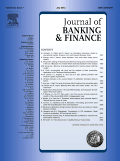
JOURNAL OF BANKING & FINANCE
Scope & Guideline
Advancing the Frontiers of Financial Knowledge
Introduction
Aims and Scopes
- Asset Pricing and Market Behavior:
The journal explores the dynamics of asset pricing, market efficiency, and the behavior of various market participants, including retail investors and institutional investors. It emphasizes both empirical and theoretical approaches to understanding price movements and market anomalies. - Banking Regulation and Risk Management:
Research on banking practices, regulatory frameworks, and risk management strategies is a core focus. This includes studies on the implications of regulatory changes, risk-taking behaviors, and the impact of banking regulations on financial stability. - Financial Intermediation and Innovation:
The journal highlights the role of financial intermediaries in the economy, focusing on innovations in banking and finance, including the rise of fintech and its effects on traditional banking models. - Corporate Finance and Governance:
Corporate finance topics, including capital structure, mergers and acquisitions, and corporate governance practices, are extensively covered, examining how these factors influence firm performance and stakeholder relations. - Behavioral Finance and Investor Psychology:
The influence of psychological factors on financial decision-making and market outcomes is a significant area of inquiry, addressing biases, sentiment, and their effects on investment strategies. - Global Financial Markets and Economic Impact:
The journal investigates the interconnectedness of global financial markets, analyzing the impact of macroeconomic factors, policy decisions, and international trade on financial stability and market dynamics.
Trending and Emerging
- Fintech and Digital Transformation:
There is a significant increase in research on fintech innovations, digital banking, and their impact on traditional financial services, highlighting the transformative effects of technology on banking operations. - Sustainable Finance and ESG Considerations:
Research focusing on environmental, social, and governance (ESG) factors and sustainable finance practices is trending, reflecting a growing concern for sustainability in investment decisions and corporate practices. - Behavioral Economics in Financial Decision-Making:
Emerging themes in behavioral economics are gaining traction, emphasizing how cognitive biases and social influences affect financial decision-making and market behavior. - Impact of Macroeconomic Shocks:
Studies analyzing the impact of macroeconomic shocks, such as pandemics and geopolitical events, on financial markets and banking stability are becoming increasingly relevant. - Data Analytics and Machine Learning in Finance:
The application of data analytics and machine learning techniques in finance is on the rise, as researchers explore their potential for improving risk assessment, investment strategies, and market predictions.
Declining or Waning
- Traditional Banking Models:
Research centered on traditional banking models and practices has seen a reduction, as the rise of fintech and alternative financial services has shifted focus toward more innovative financial solutions. - Regulatory Compliance without Innovation:
While regulatory compliance remains important, there has been a decline in studies solely focused on compliance metrics without addressing innovative regulatory practices or their implications for financial stability. - Static Risk Assessment Models:
The use of static risk assessment models in banking and finance is declining, as researchers increasingly favor dynamic models that account for changing economic conditions and behaviors. - Simple Capital Structure Theories:
Simplistic theories of capital structure are losing prominence as more complex, multifaceted approaches that consider behavioral, market, and environmental factors gain traction. - Narrow Focus on Domestic Markets:
Research that solely emphasizes domestic banking and finance issues is decreasing, with a growing emphasis on comparative and cross-border studies reflecting the globalization of finance.
Similar Journals
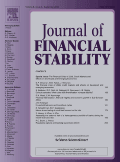
Journal of Financial Stability
Exploring innovative solutions in finance and economics.The Journal of Financial Stability, published by Elsevier Science Inc., is a renowned academic journal that serves as a premier platform for the dissemination of innovative research in the fields of finance, economics, and econometrics. With an ISSN of 1572-3089 and an E-ISSN of 1878-0962, this journal has established itself as a leader in its category, ranking Q1 for both Economics and Finance in the 2023 category quartiles. This positions it amongst the top 13% of journals in Economics and the top 35% in Finance, according to Scopus rankings. Covering a wide range of topics related to financial stability, the journal aims to fulfill its objective of advancing scholarly communication and providing researchers, professionals, and students with valuable insights into contemporary financial challenges and innovations. Operating from the Netherlands and converging from 2004 to 2024, the Journal of Financial Stability continues to contribute significantly to the academic landscape, inviting submissions that push the boundaries of knowledge and understanding in financial systems.
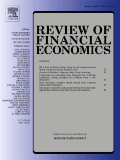
Review of Financial Economics
Advancing the Frontiers of Financial KnowledgeReview of Financial Economics, published by WILEY, stands as a prominent peer-reviewed journal in the fields of economics and finance. Established in 1994, this journal provides a platform for rigorous research and thoughtful discourse, contributing to the advancement of knowledge in financial theory and its applications. With an HIndex indicative of its citation impact, it ranks in the Q3 quartile for both Economics and Econometrics, as well as Finance, based on the 2023 categorization, underscoring its role in the academic community. Although it does not currently offer Open Access, the journal remains accessible to a wide audience through institutional subscriptions. Researchers, professionals, and students are encouraged to engage with its insightful articles that address contemporary issues and advancements within financial economics, fostering a deeper understanding of the complex interplay between economic systems and financial markets.
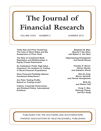
JOURNAL OF FINANCIAL RESEARCH
Empowering Researchers in Financial MethodologiesThe JOURNAL OF FINANCIAL RESEARCH, published by WILEY, stands as a pivotal platform for disseminating innovative research in the fields of finance and accounting since its inception in 1978. With an ISSN of 0270-2592 and an E-ISSN of 1475-6803, this journal aims to address contemporary challenges and trends within the financial research landscape. It has achieved notable recognition, being placed in the Q2 category for both Finance and Accounting in the 2023 rankings, signifying its relevance and impact within the academic community. Although it does not currently offer open access, the journal is accessible through various academic databases, catering to a diverse audience of researchers, professionals, and students keen on advancing their knowledge and understanding of financial systems and methodologies. With an evolving scope that encompasses empirical studies, theoretical frameworks, and practical applications, the JOURNAL OF FINANCIAL RESEARCH is committed to contributing valuable insights into the complexities of financial practices and policies.
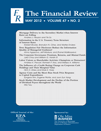
FINANCIAL REVIEW
Unveiling the Dynamics of Finance and EconometricsFINANCIAL REVIEW, a premier journal in the fields of Economics and Finance, is published by Wiley and has been contributing to the body of knowledge since its inception in 1969. With an impressive track record reflected by its Q1 ratings in both Economics and Econometrics as well as Finance, this journal stands out as a crucial resource for researchers, professionals, and students alike. The journal hosts a diverse array of scholarly articles that not only address contemporary financial issues but also provide innovative insights into economic theories and practices. Although it does not offer open access, its high impact factor and strong Scopus rankings—ranking #275 out of 716 in Economics and Econometrics and #125 out of 317 in Finance—underscore its significance in advancing academic discourse and influencing policy in the financial sector. Researchers are encouraged to explore the latest findings and methodologies shared in this esteemed journal, ensuring they remain at the forefront of their fields.

International Journal of Financial Studies
Empowering finance research through open access.The International Journal of Financial Studies is a premier publication dedicated to advancing the field of finance through open-access research. Published by MDPI based in Switzerland, this journal offers researchers, professionals, and students a platform to disseminate their findings in an accessible format since its establishment in 2013. With its ISSN of 2227-7072 and a commendable impact reflected in its Q2 ranking in finance, it occupies an influential position among finance-related journals, as evidenced by its 65th percentile rank in Scopus. The journal encompasses a wide array of topics in finance, making it essential reading for those seeking to stay abreast of current research trends and methodologies. As an open-access journal, all articles are freely available, significantly enhancing the visibility and reach of published studies, which is crucial for fostering collaboration and innovation within the global financial community. Published continuously until 2024, the International Journal of Financial Studies is not just a source of knowledge; it is a critical contributor to the progression of financial scholarship.
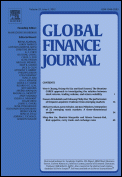
Global Finance Journal
Uncovering insights that shape financial landscapes.Global Finance Journal is an esteemed periodical published by Elsevier, dedicated to the dynamic fields of finance and economics. With an impressive history spanning from 1989 to 2024, this journal holds a significant position in the academic community, boasting a Q1 quartile ranking in both Economics and Econometrics, as well as Finance, as of 2023. It is highly regarded in Scopus rankings, placing 40th out of 317 in Finance and 99th out of 716 in Economics and Econometrics, demonstrating its influence and reach among researchers and practitioners alike. Although not an open-access journal, the Global Finance Journal provides rigorous peer-reviewed articles that explore critical issues, advance theoretical frameworks, and address practical applications in global finance. As such, it serves as a vital resource for researchers, financial professionals, and students aiming to deepen their understanding of economic phenomena and contribute to the ongoing discourse in these vibrant disciplines.

European Journal of Finance
Shaping the future of finance through rigorous research.European Journal of Finance is a prestigious publication specializing in the domains of finance, economics, and econometrics, published by Routledge Journals, Taylor & Francis Ltd. Established in 1995, this journal has become a vital resource for researchers, practitioners, and students, contributing significantly to the understanding of financial systems and markets. With its Q1 ranking in the Economics, Econometrics and Finance category, it stands out for its rigorous peer-reviewed articles that explore innovative theories, models, and empirical studies. The journal's impressive Scopus ranking of 35 out of 242 highlights its impact and relevance within the field, with an 85th percentile standing that underscores its importance to current financial research. Although it does not offer open access, the European Journal of Finance remains a cornerstone for those seeking to delve deeper into the complexities of finance, equipped with insights that drive both academic inquiry and practical application.
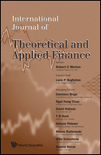
International Journal of Theoretical and Applied Finance
Illuminating the future of finance through scholarly inquiry.International Journal of Theoretical and Applied Finance is a distinguished publication in the field of finance, serving as a critical platform for the dissemination of innovative research and theoretical insights since its inception in 2003. Published by World Scientific Publishing Co Pte Ltd in Singapore, this journal boasts an impressive Q2 ranking in the realms of Economics, Econometrics, and Finance (miscellaneous) and a solid Q3 status in Finance for 2023. With a commitment to advancing knowledge in the complex world of theoretical frameworks and applied financial practices, it welcomes original research articles, comprehensive reviews, and case studies that explore varied facets of finance. Researchers, professionals, and students benefit from the journal's rigorous peer-review process and an ever-expanding repository of knowledge, making it an indispensable resource in the financial academic community. The journal does not currently offer open access, reflecting its selective approach to publishing high-quality content aimed at a specialized audience.
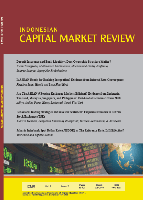
Indonesian Capital Market Review
Illuminating Investment Strategies for a Global AudienceIndonesian Capital Market Review is a prominent academic journal dedicated to the exploration of financial markets, investment strategies, and economic policies within Indonesia and Southeast Asia. Published by Universitas Indonesia, this journal has been an essential resource for researchers, professionals, and students since its inception in 2009, offering open access to its content to promote wider dissemination of knowledge. With an ISSN of 1979-8997 and an E-ISSN of 2356-3818, it aims to bridge the gap between theoretical frameworks and practical applications in the capital markets. By rigorously vetting its publications, the journal enhances the academic discourse surrounding financial systems, thereby empowering stakeholders with empirical insights. The commitment to open access ensures that groundbreaking research is readily available to a global audience, advancing the understanding of capital market dynamics in Indonesia and beyond.
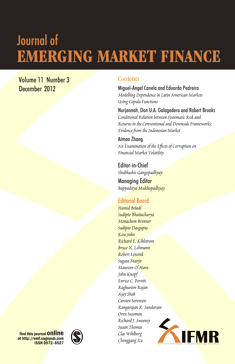
Journal of Emerging Market Finance
Exploring the Dynamics of Emerging MarketsThe Journal of Emerging Market Finance, published by SAGE Publications India Pvt Ltd, is a premier academic journal that serves as a vital resource for researchers, professionals, and students in the fields of finance and economics. Established in 2002, this journal focuses on the multifaceted dynamics of emerging market economies and their financial systems. With an ISSN of 0972-6527 and an E-ISSN of 0973-0710, it has garnered attention with its respectable Q3 rankings in both the Economics and Econometrics and Finance categories, reflecting its commitment to high-quality research. Despite its limited open-access options, the journal remains a significant platform for scholarly discussions, providing insights on emerging financial instruments, market behaviors, and economic policies in developing economies. As a continuously evolving publication, it aims to bridge the gap between theory and practice, promoting an understanding of the complexities faced in these vibrant markets, ultimately serving the academic community with relevant and impactful research until 2024 and beyond.